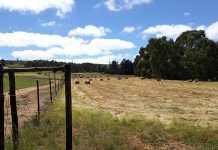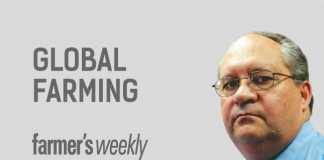In France, Marie Antoinette
literally lost her head because of her indifference to the plight of hungry people. Commercial agriculture provides enough food for South Africa’s roughly 50 million people, but our politicians will keep their heads only as long as it provides enough food for our growing population.
But instead of support, South African farmers are criticised and face threats to their property rights, live in danger of farm attacks and are unjustly accused of mistreating farmworkers. In 2009, South African agriculture contributed over R60 million, or 2,8%, to the total gross domestic product (GDP). While this is very low compared to other industries, agriculture’s real impact is much larger.
Through linkages to the agroprocessing and retail sectors, input suppliers and labour markets, agriculture’s real impact is generally estimated at about 20% of the GDP. Some economists reckon it as high as 50%. Agriculture also provides jobs, housing and social services to farmworkers. Despite technological advances, agriculture remains largely labour-intensive. In a country where one in three people is unemployed, the sector is an important stabilising factor.
A changing environment
In the past, food security meant the food was available somewhere in the world. This changed in 2007, when suddenly food was in short supply and countries limited exports. A similar thing recently happened on a smaller scale in Russia. At the Agri SA congress, Dr Mohammed Karaan warned we’ll soon face a new global food crisis.
Food security now largely depends on a country’s ability to produce it. South African farmers are technologically advanced. They produce food very economically from a limited resource base, under climatic conditions that are at best marginal. The western part of South Africa is very dry, yet maize farmers manage to efficiently produce maize there.
But our farmers receive very little government support. The agricultural producer support estimate (PSE) is at 5%, very low compared to the EU (34%) and the US (20%) rates described by the Organisation for Economic Co-operation and Development (OECD) in 2006. Farmers have very little protection against imports from subsidising countries.
Government is also reluctant to provide tariff protection, in the mistaken belief that higher import tariffs will increase local prices. Our spending on agricultural research and development is very low compared to other developed and developing countries. Despite good intentions, the Agricultural Research Council’s research capacity has declined alarmingly in the past decade.
Threats to commercial agriculture
Property rights are enshrined in our constitution. But while this remains true for people who own urban property, the property rights of farmers are continuously attacked. The publication of the Green Paper is awaited with fear. There’s no doubt that the ultimate goal is to expropriate agricultural land at prices below market value. Legislation that provides security of tenure to farmdwellers makes it nearly impossible to dismiss a worker. Add the sectoral wage determinations and other labour legislation and agricultural employment will drop sharply.
But government is coming around
Current and former Zimbabwean farmers say that the collapse of the Zimbabwean system started with the type of threat we now face. This is indeed a chilling message. However, there are still a few very important checks and balances in place in South Africa, such as a (still) free press, independent judiciary, democratic multi-party political system and the recognition of property rights in the constitution.
At the Agri SA congress, agriculture minister Tina Joemat-Petterssen said that commercial agriculture is no longer regarded as a swearword within ANC ranks. She said commercial agriculture and government should together address food security and production cost issues.
While she didn’t say how we should do it, her acknowledgement of commercial agriculture’s important role as the cornerstone of the economy shows some progress in government thinking. Government also realises that agricultural transformation is doomed without the active participation of commercial farmers.
Government probably realises that South Africa’s survival relies on the performance of the country’s 30 000 commercial farmers. We can only pray that this realisation will be followed by action, especially on the research and development side.Dr Koos Coetzee is an agricultural economist at the MPO. All opinions expressed are his own and do not reflect MPO policy.




